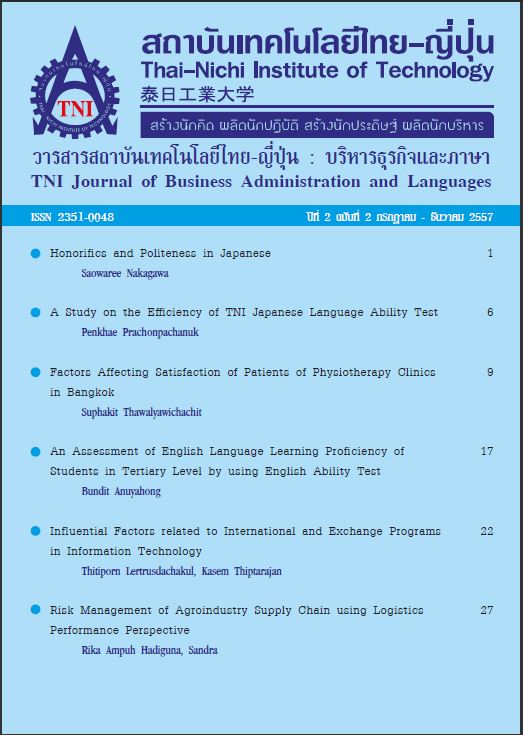A Study on the Efficiency of TNI Japanese Language Ability Test
Main Article Content
Abstract
The main purpose of this research was to study the efficiency of the 2009 TNI Japanese Ability Test. In the study, 200 students or 80% of the 250 population were drown for the study, using simple random technique. Research instrument was the 2009 Japanese Language Ability Test which was divided into 3 sections: Reading and Grammar, Kanji and Vocabulary and Listening. Data analysis was made by many statistical methods: difficulty, discrimination, reliability and validity. It was found in the study that the validity of the test was usable. In addition, it was found that the difficulty, discrimination, reliability and validity were acceptable and usable. It was shown that the 2009 TNI Japanese Ability Test was a well qualified and efficiency Test.
Article Details
Article Accepting Policy
The editorial board of Thai-Nichi Institute of Technology is pleased to receive articles from lecturers and experts in the fields of business administration, languages, engineering and technology written in Thai or English. The academic work submitted for publication must not be published in any other publication before and must not be under consideration of other journal submissions. Therefore, those interested in participating in the dissemination of work and knowledge can submit their article to the editorial board for further submission to the screening committee to consider publishing in the journal. The articles that can be published include solely research articles. Interested persons can prepare their articles by reviewing recommendations for article authors.
Copyright infringement is solely the responsibility of the author(s) of the article. Articles that have been published must be screened and reviewed for quality from qualified experts approved by the editorial board.
The text that appears within each article published in this research journal is a personal opinion of each author, nothing related to Thai-Nichi Institute of Technology, and other faculty members in the institution in any way. Responsibilities and accuracy for the content of each article are owned by each author. If there is any mistake, each author will be responsible for his/her own article(s).
The editorial board reserves the right not to bring any content, views or comments of articles in the Journal of Thai-Nichi Institute of Technology to publish before receiving permission from the authorized author(s) in writing. The published work is the copyright of the Journal of Thai-Nichi Institute of Technology.
References
] College of General Education and Languages. 2008. Self Assessment Report. Bangkok, Thai-Nichi Institute of Technology.
] Jitbanthaw, S. 2009. The Study on Beliefs of Thai Students in Learning Japanese Language. Bangkok, Thammasart University.
] Prachonpachanuk, P. 2009. Background Study for Constructing the Japanese Language Ability Test. Bangkok, Thai-Nichi Institute of Technology.
] Shuichi, S. 2008. Problems in Learning Japanese of TNI Students. Bangkok, Thai-Nichi Institute of Technology.
] Thai-Nichi Institute of Technology. 2009. Student Handbook. Bangkok, Thai-Nichi Institute of Technology.
] Utsagi, T. 2009. Relationships between Japanese Language Abilities and Learning Motivation. Bangkok: Japan Foundation Journal, No.7.


